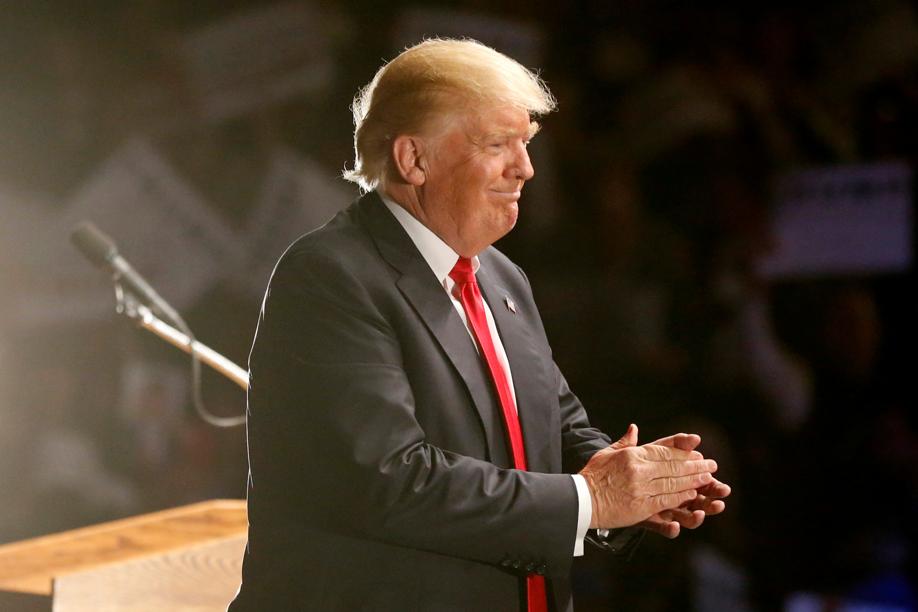
BRAINTREE — Massachusetts Republicans sounded a second loud blast of support for Donald J. Trump on Saturday, handing the GOP presidential front-runner a sweeping victory in the party’s caucuses despite his early organizational deficit.
Trump, who won the state’s March 1 primary, virtually assured himself support from a majority of Massachusetts delegates at the GOP convention in July, even if voting goes past a first ballot.
Of the 27 delegates picked Saturday, at least 23 of them had received the campaign’s blessing.
Trump picked up between six and nine additional delegates who had been vetted by his campaign and pledged to support him on every subsequent nomination ballot if necessary, Republican insiders said. Slates of Trump loyalists appeared to capture all of the available delegate slots, including alternates, in at least six of the state’s nine congressional districts.
The victory was something of a breakthrough for Trump, who has trailed chief rival US Senator Ted Cruz of Texas in other states’ contests where organization figures prominently. To win caucuses, campaigns need to identify and contact supporters, then get enough of them to town halls, middle schools, and Elks lodges, usually on untraditional voting days.
“The Cruz people, their jaws are agape, because that’s usually their territory,’’ said Louis Murray, a Quincy financial planner who was elected a delegate from the Trump slate in the 8th Congressional District. “And my hat’s off to them in every other state where they’ve done it; they’ve out-organized everyone else.’’
Trump has established a sturdy lead in the nominating contest by winning primaries, which draw more voters and hinge more on media exposure. In Massachusetts’s March 1 primary, he won more than 49 percent of the vote, his largest share of the vote at the time.
But Trump backers here worried that Cruz could team with the state’s more moderate GOP establishment to deprive Trump of delegates for the Cleveland convention, as he has in several other states. Those delegate victories prompted Trump to rip the selection process as “rigged.’’
But senior party officials said Trump has lured new voters, roughly doubling the turnout for Saturday’s caucuses four years ago.
Under state party rules, due to the primary results, Trump is guaranteed 22 of the state’s 42 delegates on the convention’s first ballot. Governor John Kasich of Ohio will collect eight, and Cruz four. Senator Marco Rubio of Florida, who suspended his campaign, is working to retain all of the delegates he won, including eight in Massachusetts.
Five of the 12 at-large delegates, who will be elected later this month, are bound to Trump on the first ballot, with the remaining seven scattered among the other delegates.
But if Trump cannot win enough delegates in the states that have yet to vote, the convention would go to a second ballot, where all of the Massachusetts delegates would be free to back other candidates, making vows of fealty to the billionaire businessman a key test in Saturday’s caucuses.
In Braintree, where more than 400 people packed a standing-room only town hall, caucus-goers elected a delegate bound to Rubio on the first ballot who promised to back Trump on subsequent ballots throughout the convention.
“The three of us have been vetted by Donald J. Trump and his advisers in New York,’’ said Ken Nasif, a retired judge living in West Roxbury, referring to the other two delegates elected off the Trump slate, Murray and Republican state representative Geoff Diehl of Whitman.
Nasif added, “If there’s a second ballot, you know I’m going to vote for Donald Trump forever.’’
Trump’s slates managed to elect delegates in every congressional district, but he romped in the central part of the state, the northeast, western suburbs, and southeastern part of the state. The campaign appeared to show weakness in only two districts: the western 1st district and Boston-dominated 7th.
The caucus results also further underscored the differences between Republican Governor Charlie Baker, who has criticized Trump and said he will not vote for him, and large swaths of the state GOP. If the March primary pointed to a disconnect between Baker and the more than 300,000 voters who backed Trump, Saturday revealed a gulf separating the governor from his party’s most hard-core activists.
Baker, despite asserting control over the state party committee earlier this year, shied away from trying to influence Saturday’s caucuses, party insiders said.
Many local Republican officeholders generally regarded as mainstream have drifted toward Trump, reflecting a national trend as officials acknowledge that Trump will likely emerge as the nominee.
“The dreaded establishment seems to be pretty much in favor of Trump,’’ said Ron Kaufman, a longtime national committeeman.
In Braintree, caucus-goers began lining up around 7 a.m., three hours before the scheduled start. Several said they had been worried by Cruz’s success in other caucuses and that they did not want to see a repeat of the 2012 caucuses, when backers of then-congressman Ron Paul felt they were cheated out of delegates.
While Cruz got less than 10 percent of the votes in March’s state primary, top Trump supporters here and unaffiliated senior Republicans acknowledged that his superior political organization posed a significant threat to Trump leading up to the caucuses.
“The real election happened between March 1 and today,’’ Murray said as voting wound down in Braintree. “The delegate race was heating up and Donald Trump said, ‘Hey, what do we need to do, who do we need to hire, how do we get the recruits to have a ground game?’ And he put a plan in place.’’
After capturing the local district’s three delegate slots early in the afternoon, Trump supporters met on the town hall’s front steps, where Murray and Diehl, brandishing a megaphone, urged their comrades to stay and vote for the alternates.
All three of those slots, including one bound to Rubio on the first ballot, went to Trump backers.
Jim O’Sullivan can be reached at jim.osullivan@globe.com. Follow him on Twitter at @JOSreports.



